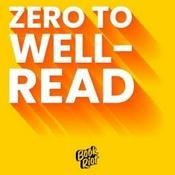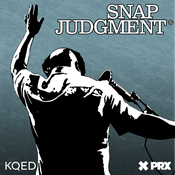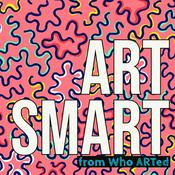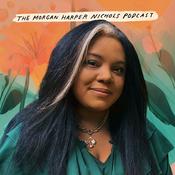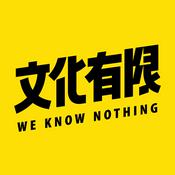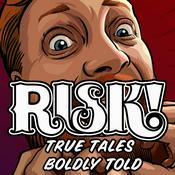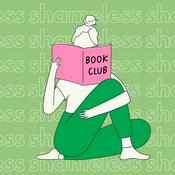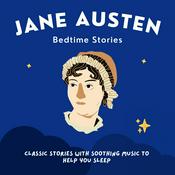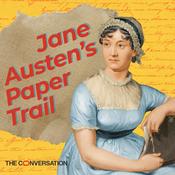36 episodes

Why We Theater Now: April 2022
09/4/2022 | 12 mins.
In this Season 2 finale, Ruthie recommends currently running Broadway and Off-Broadway shows that speak to Why We Theater. Paradise Square, now on Broadway Alex Edelman's Just For Us Ruthie Fierberg, Host Ruthiefierberg.com IG: @whywetheater / T: @whywetheater IG: @ruthiefierceberg / T: @RuthiesATrain Learn more about your ad choices. Visit megaphone.fm/adchoices

ADDRESSLESS meets Choose-Your-Own Activity
01/4/2022 | 21 mins.
In this week’s mini-episode, Ruthie recommends books—some novels, some memoirs—and television episodes that tell stories about homelessness. Then, taking a page out of Addressless’ book, Ruthie offers guides listeners through three at-home activities to better emotionally comprehend what it means to be at risk for homelessness and to experience it. Organize a Sleep Out of your own. Try Covenant House's "What Would You Do?" Activity. Instructions for Losing Your Identity courtesy of Covenant House Instructions for Privilege For Sale courtesy of Covenant House Recommended Reads: My Abandonment by Peter Rock The Motel Life by Willy Vlautin Breaking Night: A Memoir of Forgiveness, Survival, and My Journey From Homeless to Harvard by Liz Murray From the Ashes by Jesse Thistle Find your local independent bookstore. Grey's Anatomy, Season 9, Ep 6 Station 19, Season 5, Ep 12 Create the change: Learn more at the National Alliance to End Homelessness (NAEH) View homelessness statistics by state Volunteer with or donate to Covenant House; Organize a Sleep Out in your community Tell Congress to fund Homeless Assistance Grants (Click to sign a letter) Read up on current legislation that would impact homelessness How do we deal with our legislators? Improve conditions in homeless shelters: Hire well-trained staff, and hire enough of them Bring mental health services to the shelters (i.e. have AA meetings on the premises, have mental health counselors on the premises) What 4 experts have to say Find a mentorship opportunity Make cards with contact info to promote nearby shelters to hand out to those who are in need and asking for help Donate clothes, especially socks, to nearby shelters Participate in your city’s point-in-time count (signups are generally in Nov/Dec for the upcoming year - Google to find the PIT in your neighborhood) Try rapid re-housing in your community Learn about permanent supportive housing Increase employment opportunities (adjust job applications so they do not require listing a permanent address) Read the obstacles to solving the homelessness crisis—then counter them Understand why homelessness is rising Directory of Homeless Service Organizations by state Sign up for Advocacy Alerts from the NAEH Ruthie Fierberg, Host Ruthiefierberg.com IG: @whywetheater / T: @whywetheater IG: @ruthiefierceberg / T: @RuthiesATrain Learn more about your ad choices. Visit megaphone.fm/adchoices

ADDRESSLESS and Homelessness
29/3/2022 | 1h 15 mins.
ADDRESSLESS: A Walk in Our Shoes played Off-Broadway at Rattlestick Playwrights Theater in February 2022 as a virtual, interactive production. The play intimately and personally illustrated what it means to live homeless in New York City. Hungarian director Martin Boross and playwright Jonathan Payne explored this plight through three individuals living unhoused, each on a mission to acquire $1,500 while staying as healthy as they could. Experts Shams Da Baron (aka Da Homeless Hero), Covenant House International President Kevin Ryan, and playwright Jonathan Payne join host Ruthie Fierberg to dissect the play and offer answers to the solvable homelessness crisis in the U.S. View the Digital Program for ADDRESSLESS. Create the change: Learn more at the National Alliance to End Homelessness (NAEH) View homelessness statistics by state Volunteer with or donate to Covenant House; Organize a Sleep Out in your community Tell Congress to fund Homeless Assistance Grants (Click to sign a letter) Read up on current legislation that would impact homelessness Improve conditions in homeless shelters: Hire well-trained staff, and hire enough of them Bring mental health services to the shelters (i.e. have AA meetings on the premises, have mental health counselors on the premises) What 4 experts have to say Find a mentorship opportunity Make cards with contact info to promote nearby shelters to hand out to those who are in need and asking for help Donate clothes, especially socks, & personal hygience items to nearby shelters Participate in your city’s point-in-time count (signups are generally in Nov/Dec for the following year - Google to find the PIT in your neighborhood) Try rapid re-housing in your community Learn about permanent supportive housing Increase employment opportunities for those without housing (don't make a permanent address a requirement on job applications) Read: Obstacles to solving the homelessness crisis—then counter them Understand why homelessness is rising Directory of Homeless Service Organizations by state Sign up for Advocacy Alerts from the NAEH Referred to in this episode: What is StereoAKT? What is Covenant House? 2020 Point-in-Time Count About the foster care system What is a group home? Foster care vs. Group home What is transitional housing? Human trafficking and homelessness Privilege Sleep Out exercise Legislation for Wifi in all shelters Shams fact-check: Shams said, “In Harlem, 40% of the students that are in school here are, are in, are either homeless or housing or facing housing instability.” Reports show 1 in 10 NYC public school students is homeless, up to 1 in 5 depending on the area. Read more on homelessness of NYC public school students & CUNY students Greater risk of Black and brown, LGBTQ+ youth What is Community Access? How real estate development impacts homelessness How redlining impacts homelessness (more on redlining) What is the Lucerne and what was the controversy? Addressless’ How Can I Help? Worksheet (items incorporated in CTT) The Childcare Tax Credit: How does it reduce child poverty? How does that help alleviate homelessness? What is the Poor People’s Movements? What are Public Assistance Programs? Open Hearts in NYC Does shelter living cost money? Short answer: YES. About Our Guests: Ruthie Fierberg, Host Ruthiefierberg.com IG: @whywetheater / T: @whywetheater IG: @ruthiefierceberg / T: @RuthiesATrain Jonathan Payne, Playwright @JPayneWrites Shams DaBaron, Performer/Script consultant, Activist @homeless_hero Kevin M. Ryan, President of Covenant House International @CovHousePrez Learn more about your ad choices. Visit megaphone.fm/adchoices

DAVID BYRNE’S AMERICAN UTOPIA meets The Prophet
18/3/2022 | 10 mins.
Last week, American Utopia performer Tendayi Kuumba and experts Drs. Vinoo Alluri and Alejandro Lleras helped host Ruthie Fierberg take step back and welcome a broader perspective to problem-solving, beyond “What are the next steps to create change?” to “How do we find the next steps to create change?” The human brain is not a muscle, but it does need exercise—so to speak. To change the way we solve problems, we must change the way we approach problems. Change the very way we think. Actor and producer Salma Hayek had this same idea when she produced the 2014 animated film The Prophet, a movie adaptation of Kahlil Gibran’s 1923 eponymous book. Hayek also believed: “We need a new generation that goes into the unknown and finds solutions that we have not seen or heard.” So this week, Ruthie recommends The Prophet as the companion piece to American Utopia—currently on Broadway through April 3, 2022. Listen to David Byrne’s American Utopia on Spotify, YouTube, Apple Music. Get tickets to David Byrne’s American Utopia on Broadway. Watch David Byrne’s American Utopia on HBOMax. Watch the animated movie The Prophet. Purchase the book The Prophet from your local independent bookstore. Sign up for Ruthie’s monthly newsletter at ruthiefierberg.com. Referred to in this episode Read: Ways to help those in Ukraine Help refugees throughout the world Kahlil Gibran’s book The Prophet Ruthie’s Parents.com interview with Salma Hayek Connect with your host! Ruthiefierberg.com IG: @whywetheater / T: @whywetheater IG: @ruthiefierceberg / T: @RuthiesATrain Why We Theater is a product of the Broadway Podcast Network produced by Alan Seales and edited by Derek Gunther. Our theme music is by Benjamin Velez. Hear more at BenjaminVelez.com. Special thanks to Genesis Johnson, Leigh Silverman, Suzanne Chipkin, Wesley Birdsall, Elena Mayer, Patrick Taylor, and Dori Berinstein. Learn more about your ad choices. Visit megaphone.fm/adchoices

DAVID BYRNE’S AMERICAN UTOPIA and Expanding Our Thinking to Solve Problems
11/3/2022 | 1h 17 mins.
You might think David Byrne’s American Utopia on Broadway is a concert. It’s not. Yet, it’s not exactly a play or a musical. It’s something else outside the box. The Talking Heads frontman— along with choreographer Annie-B Parsons’ and a band of international musicians, vocalists, and dancers—creates a show about exploring the unconventional, especially when it comes to unconventional thought and thought processes. American Utopia made host Ruthie Fierberg wonder: How many solutions to society’s conflicts might we be overlooking because we think the way we have always thought? American Utopia performer Tendayi Kuumba and experts Dr. Vinoo Alluri and Dr. Alejandro Lleras join us to explore: What problems could we solve if we used more of our minds and used our minds differently? Could we achieve an American Utopia? Listen to the album of David Byrne’s American Utopia. Watch David Byrne’s American Utopia on HBOMax. Create the Change Volunteer with Headcount to register voters at a performance of American Utopia Volunteer with Headcount in general Cultivate new and varied ways of thinking: Enhance your own synesthesia Try any of these “6 Ways to Rewire Your Brain” If your main way of processing and working is to sit in one spot and concentrate, try talking a walk, dancing, exercising to make your brain work differently by engaging different activity patterns in your brain. Develop your “openness” (one of the Big 5 personality traits) Read about how openness can help you see the world differently Read David Byrne’s How Music Works Listen to music outside of your normal playlist Dig into more research on music and cognition Listen to “happy” music to promote divergent thinking (which leads to increased creativity) Explore social justice through music, a curriculum Improve your allyship Referred to in this episode (in order of mention) Letter from David Byrne about American Utopia Listen to “Here” from American Utopia See American Utopia’s set and costumes Read about and watch Annie-B Parsons’ American Utopia choreography Your brain on music Your brain listening to different genres of music Grooviness of music What is embodied cognition? What is embodied cognition to music? American Utopia’s partnership with Headcount Watch Janelle Monae’s official music video for “Hell You Talmbout” Your brain choreographed movement vs improvised movement Watch this video debunking the MYTH: “Humans use 10 percent of our brains.” What is pruning in the brain? Babies learning language What is synesthesia? Research by Berit Brogaard to unlock more of brain’s potential The truth about left brain vs. right brain What is dadaism? Listen to “I Zimbra” from American Utopia David Byrne Talks Being a Good Ally and American Utopia How making music can promote brain plasticity About Our Guests: Ruthie Fierberg, Host Ruthiefierberg.com IG: @whywetheater / T: @whywetheater IG: @ruthiefierceberg / T: @RuthiesATrain Tendayi Kuumba, Performer @whostendayi Dr. Vinoo Alluri PhD, musicologist and neuroscientist Dr. Alejandro Lleras PhD, psychologist Learn more about your ad choices. Visit megaphone.fm/adchoices
More Arts podcasts
Trending Arts podcasts
About Why We Theater
Listen to Why We Theater, ill-advised by Bill Nighy and many other podcasts from around the world with the radio.net app
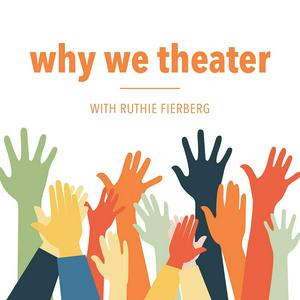
Get the free radio.net app
- Stations and podcasts to bookmark
- Stream via Wi-Fi or Bluetooth
- Supports Carplay & Android Auto
- Many other app features
Get the free radio.net app
- Stations and podcasts to bookmark
- Stream via Wi-Fi or Bluetooth
- Supports Carplay & Android Auto
- Many other app features


Why We Theater
download the app,
start listening.





